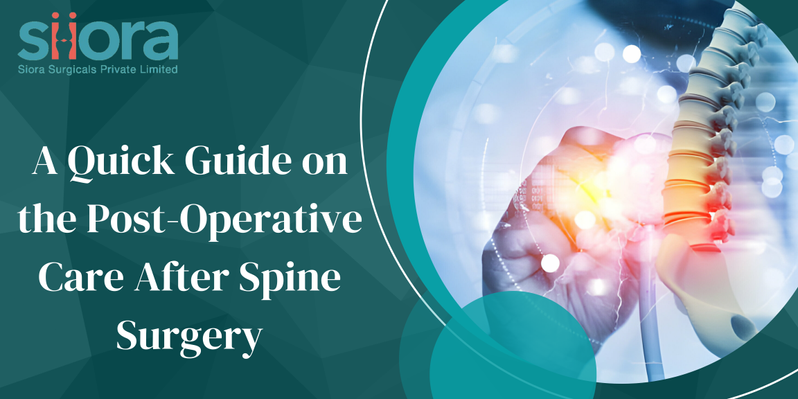Undergoing spine surgery is a significant step towards improving one's quality of life, but proper post-operative care is crucial for a successful recovery. After the surgery, it's essential to follow your doctor's instructions carefully to ensure the best possible outcome and make sure the spine implant, if applied, is functioning well. Here's a guide to help you navigate the post-operative period and promote healing.
Post-Operative Care After Spine Surgery
Pain Management
Pain is a common after-effect of spine surgery. Your doctor will prescribe pain medication to help manage discomfort. It's crucial to take these medications as directed and not to exceed the prescribed dosage. Additionally, using ice packs as recommended can help reduce swelling and alleviate pain.
Wound Care
Proper wound care is essential to prevent infection. Clean the wound periodically as suggested by the healthcare service provider and do not keep it wet. Your doctor will provide instructions on how to change dressings and when to shower. If you notice any signs of infection, such as increased redness, swelling, or drainage from the incision site, contact your healthcare provider immediately.
Physical Activity
While it's essential to rest and allow your body to heal after surgery, some gentle physical activity is beneficial. Your doctor will recommend specific exercises to help strengthen your back and improve flexibility. It's crucial to follow these recommendations carefully to avoid straining your back.
Diet and Nutrition
Eating a healthy diet is essential for healing. Ensure you're getting enough nutrients, especially protein, to support tissue repair. Stay hydrated by drinking plenty of water. Avoid foods that can cause constipation, as straining during bowel movements can put stress on your back.
Mobility and Rehabilitation
Depending on the type of surgery you had, you may need assistance with mobility initially. Your healthcare team will provide guidance on how to move safely and may recommend the use of assistive devices such as a walker or cane. Physical therapy may also be recommended to help you regain strength and mobility.
Follow-up Care
Follow-up appointments are important to check healing progress. If any complications arise the surgeon will address them timely. So, do not miss your follow-up appointments. These appointments allow your doctor to monitor your progress and address any concerns you may have. Be sure to communicate openly with your healthcare team about how you're feeling and any challenges you're facing during your recovery.
Emotional Support
Recovering from spine surgery can be challenging both physically and emotionally. It's normal to feel a range of emotions, including frustration, anxiety, and sadness. Seek support from friends, family, or a mental health professional if you're struggling emotionally.
Precautions and Restrictions
Your doctor will provide specific instructions on activities to avoid during your recovery. It's important to follow these guidelines to prevent injury and promote healing. Avoid lifting heavy objects, bending at the waist, or twisting your spine.
The Last Say
In conclusion, proper post-operative care is essential for a successful recovery after spine surgery. By following your doctor's instructions, staying active, eating a healthy diet, and seeking support when needed, you can promote healing and return to a fulfilling life.
To get a CE-certified range of spinal implants, contact Siora Surgicals Pvt. Ltd., a renowned orthopedic manufacturer in India. The company is also a regular exhibitor at the Florida International Medical Expo.

